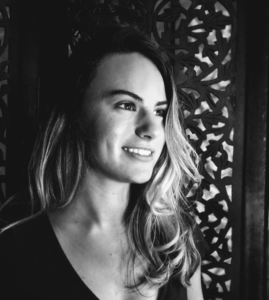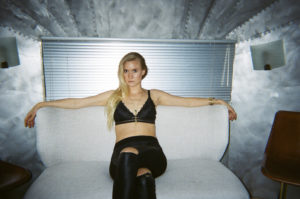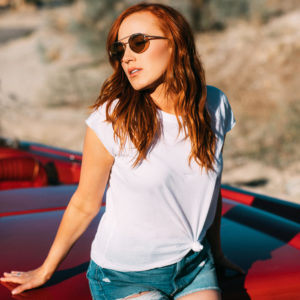
Singer-songwriter Paula DeFrancis began her extensive musical journey by learning to play the flute at 8 years old, followed by guitar and then the piano. Later, in high school, she began writing her own music. She was formally trained in classical singing but her goal was to become a music educator, not a professional singer. Paula would go on to perform and study a variety of instruments and genres of music all over the world including throughout the US, Canada, and Ghana – West Africa.
During her freshman year in college, she began to perform her own songs at Washington DC area events and coffee shops. While in college, Paula toured the northeastern United States with the VCU Commonwealth Singers, culminating in performing with the Philharmonic Symphony Orchestra in Montreal, Canada.
Born and raised in Arlington, Virginia, Paula wanted an adventure, to serve others, and test her limits after she received her Bachelor of Music in Music Education from Virginia Commonwealth University’s nationally renowned School of the Arts. This decision would lead her to Atlanta, Georgia where she would serve in the AmeriCorps. During her time of service, Paula received training as a certified West African therapeutic drumming instructor.
After the AmeriCorps, she went on to teach music in the northern Virginia area school system, but after spending more time in Atlanta and fulfilling her dream of traveling with an extended tour through Europe, she landed back in Washington, DC. Paula would go on to connect with other musicians, pursue her projects, and build a large music clientele in the area. She currently offers lessons in voice, flute, guitar, and djembe (West African drum).
In 2018, Paula released her debut single, “Channel Home”, a deeply personal song which she wants listeners to interpret for themselves. She is currently working on the early songwriting stages of a full EP as well as other projects for 2019.
Recently, I interviewed Paula in-depth via email about her debut single, West African therapeutic drumming, training in classical singing, performing all over the world, music teaching, and much more.
Can you guess what Paula’s superpower is? Check out her video after the interview for her answer!
Congratulations on your debut single release, “Channel Home”. What is the concept/theme of the song? What inspired you to write it?
Thank you – it has been an exciting time!
This was a deeply personal song for me to write and express. I want my listeners to be able to interpret “Channel Home” in their own way, but I will say the song is about a rare feeling, one of deep familiarity, from deep within your gut.
While these moments are fleeting in our lives – we’re lucky if we catch a glimpse – so many of us are desperately longing to feel truly at home, to be seen, to be fully understood. After about six years of not ever truly finishing any of my original songs, I wrote this within a week after having an experience that left me a bit shaken – I was reminded of the kind of life I want to live and the kind of person I want to be, and already am.
What do you want listeners to take away from “Channel Home”?
Don’t ignore people, places, or experiences that align with the values that are most important to you. This is rare and beautiful and you deserve to live an intentional life that feels right for you. Be grateful for those moments as they are, sometimes they are fleeting, and that’s okay. Life is messy.
Explain your production process.
Almost as soon as I finished writing the song, I sent it to my friend Jeremy Barr, who works as a sound engineer out in Los Angeles, and owns his own production company, Oddly Enough Productions LLC. He told me he loved it and he’d be happy to do all the mixing and mastering with his equipment. He was so supportive and even helped me when it came to marketing and releasing the single in August of 2018.
I recorded the vocals and piano separately at a friend’s home studio right outside of Washington, DC. I was able to record the piano accompaniment in one take, after some practice, and about ninety percent of the vocals are from the same take as well. I would say it’s a pretty raw/stripped recording, and I am so grateful for my friend Ahmad (also known as super talented hip-hop artist Silo Mentality) who was super patient with me, and when it came to getting me ready to hit those high notes at the end, he was an awesome cheerleader.
You have a formal background in classical singing. How has this influenced the vocal style of your music? What are the advantages/disadvantages of taking classical voice lessons?
This is a great question! My classical training prepared me to be highly aware of the healthy and unhealthy ways to sing. Many singers go on to lose their singing voices later in life, get “nodes”, or face other consequences for not singing in a healthy way, and that is a major advantage of taking classical voice lessons. True classical singing is a sustainable way to perform that will not lead to those same consequences. Formal lessons will teach you poise, healthy and supportive breathing, and train your musical ear to help you hear when you’re off and overall make you a far better musician.
I would say that if my classical background affects my current style of music, it is only subconsciously. As far as my vocal tone, though, I would say the clarity and intonation of my voice are far better after having such intensive training.
Why did you decide not to pursue a musical career as a classical singer?
When I went to music school, I always planned on becoming a Music Educator and not a performer. Singing art songs and opera as a soloist or on stage was always a joy for me, but I was not as passionate about that kind of music as I am about other genres like jazz/singer-songwriter. I admire and support all of my friends who have gone on to perform in opera houses around the country and the world. It is an intensely competitive profession and takes a lot of courage and passion to embrace.
You have performed and studied a variety of instruments and genres of music all over the world including throughout the US, Canada, and Ghana – West Africa. Tell us more about that experience. What instruments did you play and what genres of music? What were some favorite moments/memories?
While I was a member of the VCU Commonwealth Singers under the incredible direction of the late Rebecca Tyree, we toured up the northeast of the United States in a coach bus, performing at churches and schools along the way. Our final destination was Montreal, Canada, where we performed with the Philharmonic Symphony Orchestra, which was an honor. Touring on a bus with around forty college kids – there was never a dull moment.
While I was in Ghana, I studied West African drumming, dancing, and singing, and that was a life changing experience for me.
The people in Ghana are so warm and friendly, and music is valued by everyone as an important and respected part of the culture. This inspired me to continue to study West African drumming during my AmeriCorps service in Atlanta, Georgia, and we performed around that region of the United States during our training.
After graduating with a music degree from college, you went on to Atlanta, Georgia to serve in the AmeriCorps where you received certification in West African therapeutic drumming. Explain what AmeriCorps is, why you decided to join, and how it ties in with your musical path.
The AmeriCorps is a national service organization, like the PeaceCorps, but AmeriCorps service members only serve within US borders. They cover a range of services like education, community building, agriculture, and natural disasters. I decided to join because I wanted an adventure, I wanted to serve others that needed me, and I wanted to test my limits.
I served as a life-skills tutor to troubled youth at a psychiatric residential treatment facility, which offers alternative therapies to their members, like West African Therapeutic Drumming.
I have always been captivated by all kinds of world music, and with my background in West African drumming from Ghana, I was really interested in cultivating those skills. The program offered free training to their AmeriCorps service members, and that’s why I chose the program. I also was able to teach after-school music programs to the kids there, in a range of genres, and I even led my AmeriCorps team in a rendition of “Somebody I Used to Know” using only boomwhackers.
Tell us about your extended tour through Europe you embarked on before settling in Washington, D.C.
After saving up some money from my year of full-time music teaching in Fairfax County Public Schools, I was ready to fulfill some of my dreams of travel. A friend and I spent two months living in Spain, to work on our Spanish skills, experience the music, the food, the culture, and then about two weeks each in Sweden and Italy. I have extended family in Italy and had been fantasizing about visiting since I was a little girl. We also were able to briefly visit Morocco and Portugal. I am very privileged to have been able to have that experience, the world is a beautiful place and I love to meet people that come from different cultures and backgrounds and really immerse myself in a different way of living. It’s good for the soul to get some perspective.
You have an extraordinary musical background from training to your current career as a music teacher offering voice, piano, flute, guitar, and djembe (West African drums) lessons. Why have you decided to pursue a solo artist career?
I like my freedom, which is a gift and a curse. Managing my own clientele and supporting my solo music projects can be stressful, but I have a vision, and it is so empowering to be able to make that a reality.
In regards to the piano, flute, guitar, and djembe, what was it about each one that drew your interest in playing them?
The first instrument I played was the flute when I was about eight years old. Simply put, I was a girly-girl back then, and I thought it looked and sounded pretty! The guitar was next, my Dad always played guitar, and it was great to be able to accompany myself. Piano became a necessity as I decided to pursue music school, and later on became a joy as my skills were honed and I was able to write my own music. Djembe was just incredibly fun – and I have a knack for percussion, which is a weird combo with classical singing, but hey, that’s me.
What is your songwriting process? Where do you get your ideas from for your songs?
All over the place! I sing to myself all the time, sometimes at the top of my lungs when I’m home alone, and that’s usually where I get my ideas. I’m a feeler, and I usually get my inspiration from people, pain, love, and going after my non-musical dreams in life has been a huge catalyst for my music.
How do you manage/balance being both a professional musician and music teacher?
My music teaching is a constant, and my professional music projects are on the side, as I am able. I have so much fun writing music, collaborating with other artists, that it’s a welcome activity that keeps me from worrying about the day-to-day struggles of life. I’m multi-passionate, and my brain has always worked this way, I actually tend to do best when I have multiple projects going on and am making things happen.
What musical projects did you “give fire to” when you landed back in DC? What was the similar vision you had with the musicians you connected with?
My first project was preparing a jazz/bossa nova set with a good friend of mine, Said Tinat. He is an incredible musician, and he has been my mentor ever since. We rehearsed together and performed at an Open House. Said loves music with complex chord structures and lyrics with meaning and integrity. That, I connected with.
Another simultaneous project was with my friends Jeremy Barr and Silo Mentality, recording an Intro song called “New Day” for Fousey Tube on YouTube. They had never heard me sing before, and they wanted me to basically give it everything I got, which was an amazing feeling, and I had never shown that side of my voice to anyone before!
They booked me to be featured on Silo Mentality’s EP “Isolated from Chatter Above” a few months later. Silo Mentality’s sound has soul, and that gave me a chance to really explore that side of my music, which I have always leaned towards, but not as a performer until then.
How do you think women can be better supported in indie music?
When you see or hear a female artist whose music you like, buy their music! Buy their merch, or book tickets to see them again. If you don’t have the money, share their posts, post a comment, watch their videos, and spread the word! Share your thoughts with them, share your encouragement. All artists have their own process and way of being, and it is important not to put further pressure on artists to be performing, writing, or creating a certain way.
It may seem like an artist is flourishing and relishing in their success, but sometimes a short message about how their music has impacted you can go a long way.
What advice would you give to women thinking about or actively pursuing a music career?
If you’re writing, don’t wait for things to feel just “perfect” before sharing it with the world. It will probably never feel perfect, and if you keep waiting, it will never happen. Meanwhile, you’re keeping your incredible gifts from the world. Do it for yourself, not for others, you’ll make mistakes, and you’ll get better. People can be cruel, but those people’s opinions don’t matter. You’re creating music for yourself and for the tribe of people who will feel a deep connection with your music. That’s your audience.
What are your tour or show plans for 2019?
None at the moment, follow me on IG: pauladefrancis for more music and music-related news and updates!
What other projects are you working on for 2019?
I am currently in the basement/early writing stages of creating a full EP, so stay tuned for more in the coming months!
Thank you, Paula, for the opportunity to interview you!
VIDEO: BONUS QUESTION – What is your superpower and how do you use it in your music?
Follow Paula on social media:
Instagram: pauladefrancis
Spotify Artist Page: Paula DeFrancis
YouTube: Paula DeFrancis
“Channel Home” is available for purchase here: iTunes and Amazon

